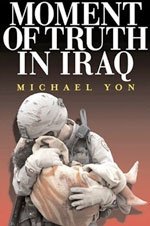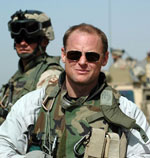 Someone compared Michael Yon to Ernie Pyle, the World War 2 reporting legend, and that got me interested in reading Yon’s book, “Moment of Truth in Iraq.” Yon, a former Green Beret, has spent more time embedded with combat troops in Iraq and Afghanistan than any other reporter. I like that kind of writing. And I loved this book. I learned much that I didn’t know, and have had to alter some of my views.
Someone compared Michael Yon to Ernie Pyle, the World War 2 reporting legend, and that got me interested in reading Yon’s book, “Moment of Truth in Iraq.” Yon, a former Green Beret, has spent more time embedded with combat troops in Iraq and Afghanistan than any other reporter. I like that kind of writing. And I loved this book. I learned much that I didn’t know, and have had to alter some of my views.
I wouldn’t compare his writing to Ernie Pyle, who wrote fascinating human interest stories about American soldiers in the midst of war. Yon does share Pyle’s admiration for American soldiers, and he gets up close and personal. He, like Pyle, lives with soldiers on the Sharp Edge. But the writing style is different.
Gen. David Petraus praises the book. “He’s fearless…provides a candid, soldier’s eye view…from the very unique perspective of being there with them for weeks and months at a time.”
Yon goes into battle many times and describes those firefights and the acts of valor he witnesses. I was deeply moved by many little vignettes. However, it’s not a sugar-coated book. He’s an objective reporter with no agenda to pursue or legacy to protect, so he points out warts when he sees them. But overall, I came away from the book thinking, “Wow, things are going a lot better in Iraq than I thought.”
Yon arrived in Iraq in December 2004, when things were going very badly and our civilian leaders were in the “State of Denial” described in Bob Woodward’s book. But over the next several years (Yon’s book was published in 2008), you see things turn around, particularly under the leadership of David Petraus. Yon doesn’t deal with the dramas surrounding the budding Iraqi government, and only tangentially with the US civilian leadership. Rather, his focus is on soldiers on the front lines, and how a change in approach–the application of counter-insurgency principles–made a vast difference.
And let me emphasize: the turn-around Yon describes occurred on George Bush’s watch (though mostly after Rumsfield left and Cheney was marginalized). Obama has wisely continued the approach he inherited.
 Yon (left) superbly pictures the principles of counter-insurgency in action. You really need to see these principles lived out to appreciate them. Thomas Ricks talks about counter-insurgency theory in “Fiasco,” which ends just as David Petraus is taking over, and he describes a couple major success stories–one in 2003 when Petraus commanded the 101st Airborne in Mosul, and then later in Tal Afar (both of which were basically rogue operations by individual commanders who “got it”). But counter-insurgency principles permeate Yon’s book, and you can’t help but realize, “We should have been doing this all along.” Yon, as a Green Beret, was trained in these principles, so he understands what he’s looking at.
Yon (left) superbly pictures the principles of counter-insurgency in action. You really need to see these principles lived out to appreciate them. Thomas Ricks talks about counter-insurgency theory in “Fiasco,” which ends just as David Petraus is taking over, and he describes a couple major success stories–one in 2003 when Petraus commanded the 101st Airborne in Mosul, and then later in Tal Afar (both of which were basically rogue operations by individual commanders who “got it”). But counter-insurgency principles permeate Yon’s book, and you can’t help but realize, “We should have been doing this all along.” Yon, as a Green Beret, was trained in these principles, so he understands what he’s looking at.
Some of the other things I took away from the book:
- The perpetual lack of troops. We didn’t go in with nearly enough troops, and we’ve never had enough since. The surge helped (and we must be careful not to draw down prematurely).
- Yon describes what we’re doing as a “values-driven counter-insurgency.”
He criticizes brute-force tactics common earlier in the war, along with the
torture and abuse of prisoners. He continually stresses the critical
importance, in an insurgency, of occupying the moral high ground. I’ve
read about this, but Yon gives vivid examples of the principle in
action. This, more than anything (more than the surge), has turned
things around for us in Iraq. - Al Qaeda’s brutality has turned the Iraqi people against it. Al Qaeda is on the run in Iraq, he says. Iraqis realize that the Americans, not Al Qaeda, have Iraq’s best interests at heart. He gives many examples of the senseless brutality of Al Qaeda (like baking an 11-year-old boy and feeding him to his parents). He also shows the many ways Iraqi citizens are now helping us (calling in or pointing out the location of IEDs, or emailing Google Earth maps showing where to find terrorists).
- The Iraqi soldiers have gotten a bad wrap. Yon goes into battle with Iraqi soldiers, and talks to American soldiers who have fought alongside them. We’ve heard the negative stories, about Iraqis sitting on the sidelines while Americans do the fighting. But Yon describes well-trained Iraqis who never back down from a fight, and who are ferocious allies in fighting Al Qaeda. This is an undertold aspect of the war.
- He points out that a hidden skill set of the military is how to run a city–invaluable knowledge in restoring normality in Iraq. He says that knowledge comes from running large military bases around the world, where officers must deal with water, electricity, sanitation, sewage, police, courts, prisons, fire, schools, and everything else that a city deals with.
- Yon shows the sheiks uniting behind the Americans, especially in Anbar. We think of them as being religiously motivated, but Yon says, “Shieks are businessmen. Ultimately the sheiks of Anbar turned against al Qaeda because al Qaeda was bad for business.”
- During the fierce battle for Baqubah, Yon describes how, throughout the battle, Americans worked with Iraqi civilian leaders to deal with city services even as they tried to subdue the city. “[Commanders] alternated between teatime, firefight, teatime again, while figuring out food distribution, firefight, raid, IED, collapse from exhaustion, firefight, teatime, while arguing about some water pipes, and then firefight again.”
- Yon depicts American officers showing incredible wisdom in dealing with difficult situations, some in harrowing situations.
- Yon dismisses the idea of partitioning Iraq into Kurd, Sunni, and Shia areas, as has been proposed. He argues that though these groups don’t get along, and don’t mind slaughtering each other, Iraqis consider themselves foremost to be Iraqis.
- Yon also spent time with British troops in Basra, and tagged along with them into some ferocious firefights. He highly respects the British.
In September 2007, Yon returned to the States and was dismayed at the “tremendous gulf between what was actually happening in Iraq and what people in America thought was happening. It was as if the inertia of the bad news from the previous three years had made it impossible to take in new information.”
He had seen a transformation in Iraq which he describes as miraculous, but Americans back home seemed oblivious. Yon writes, “It was far too early to declare victory. But it was definitely time to declare serious progress.”





